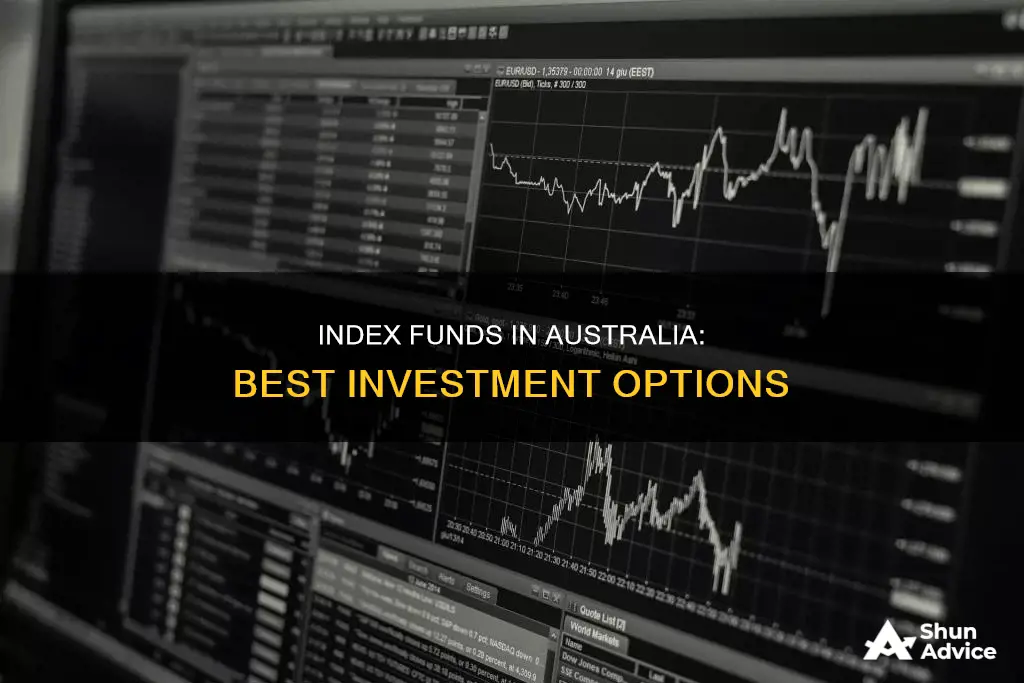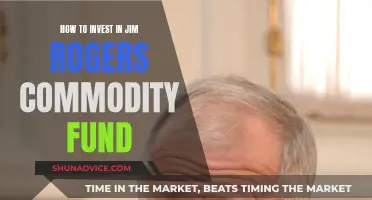
Index funds are a popular investment option in Australia, offering a hands-off approach to investing in a range of shares and other asset classes. They are typically low-cost, diversified, and provide exposure to various companies and sectors. When choosing an index fund to invest in, it's important to consider factors such as fees, performance, investment philosophy, and your own financial goals and investment strategy. In Australia, there are several index fund options available, including managed funds, exchange-traded funds (ETFs), and investment platforms. It's essential to understand the risks and do your research before investing.
What You'll Learn

Broad-based index funds
Broad-based indexes are designed to reflect the movement of a group of stocks or an entire market. They are used as a benchmark to track the performance of a large group of stocks selected to represent the broader stock market. One of the broad-based indexes with the fewest stocks is the Dow Jones Industrial Average (DJIA), which consists of just 30 stocks. One of the largest is the FT Wilshire 5000 Index (FTW5000), which originally tracked approximately 5,000 stocks but has since shrunk to 3,687 stocks as of January 2022.
Broad-based indexes are often market-value weighted, meaning that large companies have a greater influence on the index's price changes compared to smaller companies. The ASX 200, for instance, is a market-cap-weighted index, with each company's market capitalisation determining its weighting in the index.
Broad-market index funds are sometimes referred to as total market index funds. They attempt to duplicate the performance of an entire investable market by buying up thousands of different types of bonds with different maturities. They are considered one of the safer options among index funds because they are diversified across the entire market.
In Australia, broad-market index funds include the Vanguard Australian Shares Index ETF (VAS), which tracks the S&P/ASX 300 index, and the SPDR S&P/ASX 200 (STW), which is pegged to the ASX 200.
Private Equity Funds: Impact Investing Strategies Revealed
You may want to see also

Sector-based index funds
Sector-based ETFs invest in specific sectors of the Australian market, such as banks, financials, resources or property. Examples include the BetaShares Australian Resources Sector ETF, the VanEck Australian Banks ETF, and the BetaShares Australian Financials Sector ETF.
International sector ETFs track sectors and industries in overseas markets, such as technology and healthcare. Examples include the Global X Battery Tech & Lithium ETF, the BetaShares Global Energy Companies ETF, and the BetaShares Global Cybersecurity ETF.
If you're looking to invest in a particular sector of the Australian or international market, sector-based index funds could be a good option. They allow you to focus your investment on an area that aligns with your interests or expertise. However, it's important to remember that sector-based funds can be more volatile than broad-market funds, as they are more susceptible to changes in the specific sector they track.
When considering a sector-based index fund, it's crucial to research the fund's performance, fees, and investment philosophy. Additionally, you should evaluate your investment goals and strategy before making a decision.
Equity Funds: Where to Invest and Why
You may want to see also

Market-cap index funds
- VanEck Small Companies Masters ETF (MVS) - This exchange-traded fund (ETF) only tracks companies with a smaller market cap, allowing investors to diversify their portfolio beyond the major companies held in broad-market index funds.
- They are considered a form of passive investing since fund managers are not actively buying or selling assets to try to outperform the market. Instead, they simply follow the market by replicating the performance of a specific index.
- Market-cap index funds can be purchased through an online stockbroker or directly from a fund provider, such as Vanguard Investments or BlackRock. However, funds purchased directly from a fund provider often have high minimum investment requirements, ranging from $5,000 to $100,000.
- When investing in market-cap index funds, it is important to consider the management fees charged by the fund manager. The most common fee is the management expense ratio (MER) fee, which is typically around 0.5% per annum of your total portfolio.
- Market-cap index funds are considered a relatively safe investment option since they are less volatile than individual stocks. However, it is important to note that any investment carries some level of risk.
Mutual Fund Investment: Where to Begin?
You may want to see also

Smart-beta index funds
Smart-beta ETFs screen and weigh securities based on factors other than market capitalization. For example, a smart-beta ETF might choose companies that exhibit certain behaviours or metrics like earnings growth, the extent to which the stock moves up or down, or profitability.
- Equally weighted: Instead of weighting the fund based on stock price and market capitalization, this strategy equally weights the factors and each holding.
- Fundamentally weighted: Companies are selected and weighted by factors such as total earnings, profits, revenue, or other financially driven fundamentals and metrics.
- Factor-based: Stocks are weighted based on specific factors such as balance sheet components, underpriced valuations, or smaller companies that are growing.
- Low volatility: This method focuses on stocks and indexes with small price fluctuations over a historical period.
Smart-beta ETFs are a common choice for investors hoping to maximise their income and returns while minimising risk. However, they are a relatively new method of investing and exhibit low trading volumes. As a result, the fees charged for smart-beta funds might be lower than actively managed funds, but the savings might not be significant.
Rental Property vs Mutual Funds: Which is the Better Investment?
You may want to see also

Commodity index funds
Commodity ETFs (exchange-traded funds) are a popular type of commodity index fund. They allow investors to gain exposure to the performance of selected hard and soft commodities as simply as buying any share on the Australian Securities Exchange (ASX).
Commodities that are often included in these funds include:
- Precious metals (e.g. gold, silver, platinum)
- Oil
- Agricultural products (e.g. soybeans, wheat)
- Livestock
- Sugar
Commodity ETFs are generally "synthetic", meaning they are based on financial contracts over commodities rather than investing directly in the commodities themselves. However, some ETFs do invest directly in the physical commodity, such as the Betashares Gold Bullion ETF – Currency Hedged (ASX: QAU), which is backed by physical gold held in a vault.
- BetaShares Crude Oil Index ETF-Currency Hedged (Synthetic) (OOO)
- Perth Mint Gold (PMGOLD)
- Global X Physical Gold (GOLD)
- VanEck Gold Bullion ETF (NUGG)
- BetaShares Gold Bullion ETF (Currency Hedged) (QAU)
- Global X Physical Precious Metals Basket (ETPMPM)
- Global X Physical Platinum (ETPMPT)
- Global X Physical Silver (ETPMAG)
HOA Reserve Fund Investment Strategies: Where to Invest for Growth
You may want to see also
Frequently asked questions
An index fund is an investment portfolio that tries to track a specific financial market, typically the stock market. Index funds pool money from a large number of investors and then use the funds to create a diversified portfolio of stocks, bonds, commodities or other assets.
Index funds have low fees, allow you to invest overseas, can achieve higher returns, are easy to trade, can diversify your portfolio, and are relatively safe and tax-efficient.
Like any investment, there is a chance you could lose your money. Index funds are not a short-term investment strategy and may not be suitable for those with a short time frame. Some index funds may also track volatile global markets, so it's important to do your research.







